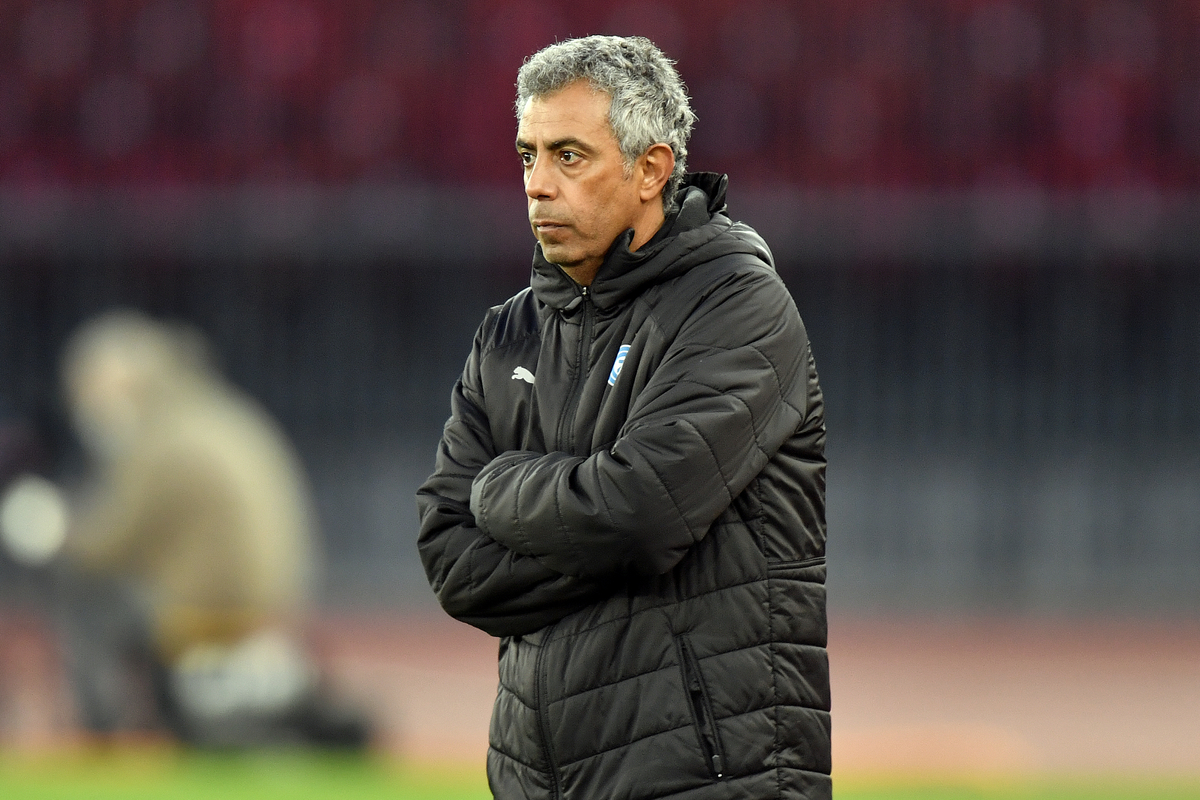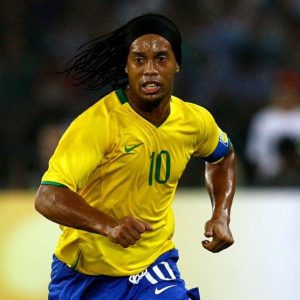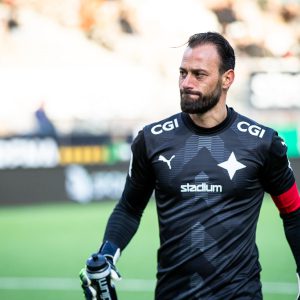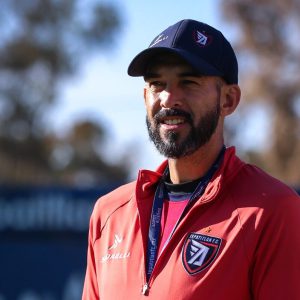

João Carlos Pereira: “Usually, I feel good as a coach if I have minimal resources” (Part I)
Photo credits: Grasshopper
João Carlos Pereira has extensive experience as a head coach in incredibly diverse competitive contexts – Portugal, Switzerland, Cyprus, Qatar, and Kuwait. In this first part of an exclusive interview, he tells us about how life contingencies led him to become a football coach, his initial contact with youth football, and the invitation to partake in the formative process of young athletes for the 2022 FIFA World Cup, under an incubation philosophy, at Aspire Academy.
As a football player, João Carlos Pereira prematurely hung up his boots at 32. Although he had planned to move into the entrepreneurial world in his post-career, he unexpectedly kept linked to football. “I never saw myself as a football coach. In the last years of their careers, and even earlier, some of my teammates started taking notes on training exercises or game theory. I never had any concerns about it since I thought I did not have the profile to be a coach. Besides, I had also programmed my life after a serious injury at 22. I still played for three years as a professional, but I could not reach the performance I expected, so I continued to play as an amateur and went back to college. At the end of the season [1996-1997], I had finished the course, I was already doing an internship, and told people that I was not going to play anymore. A short time later, I was challenged to coordinate the whole youth football at AC Marinhense. Initially, I said I did not want to, since I wanted to get away from football to fully focus on a new career in the business area – my academic background was business relations. They insisted, and I ended up accepting the challenge. After a short time, there was a meeting at the club, and they called me to say that the head coach [of the first team] was sick. They needed someone to take care of the team until he convalesces. That was right at the beginning of the season. They were my former teammates! I did not like that idea, but they insisted and said it would only be until September. That is when I started my journey as a football coach”.
It was a very difficult situation because I was not prepared, and the ideas came from the other coach. I had to go to his house to discuss training sessions and all issues related to managing a football team with him, and then had to apply it to training sessions, matches, etc.
“We were at the bottom of the table, in the Portuguese third division, and in December his health condition got worse. At one point, he said not to go to his home anymore. From there, I started to prepare everything and do the best I could. Fortunately, we ended the season well and the following year, with practically the same squad, we sealed promotion”, he said.
Since then, the Portuguese coach has toured multiple divisions, progressing upwards and training at a senior level. His first interaction with youth football came at an early phase of his career. “Before going to Qatar, I was at a stage in my career that I was not very satisfied with, for several reasons. Mainly because I was constantly jumping from club to club. I had periods of six months working and another six at home. One year at work, one at home. The last clubs I coached in the last four seasons, for example, had a lot of problems. The clubs did not pay and had salaries in arrears. There were completely adverse circumstances to develop a decent job, so I paused and began to think about what I could do. Then, the possibility of going to Qatar for a completely different project arose. At that point, I felt that I would have another kind of stability and take advantage of that context to evolve, acquire more knowledge and develop networking. It started to make sense to work on youth football, and I even recommend any coach to go through it. Now, having gone through youth football and the competitive/professional zone, I own a broad knowledge that allows me to comprehend the whole chain from upstream to downstream of what it is to develop a player and compete at different levels”.
Although there may not always be planning, strategy, and objectives set at a professional level, João Carlos Pereira believes it is possible to build a stable career as a football coach. “Pep Guardiola has that kind of career. The problem is that, sometimes, there is a big discrepancy between the clubs’ and coaches’ expectations. There is also a big disparity between what the coaches need to develop their work and what the clubs can provide. Above all, there must be a convergence between the project, vision, and philosophy of both parts”.
I am one of those who believe – and history proves me right – that clubs that replace their coaches less often, have fewer changes in their squads from season to season, and do not substitute their technical management are the most successful.
“There are a lot of clubs and coaches that are successful from time to time because they have good players, a season goes nicely, the other opponents were not so good at that period, or the coach was ideal for that context. I usually say that there are many good coaches, but not all of them are the right ones for certain contexts. The same goes for players”.
Throughout his professional career, the 56-year-old coach has accumulated a wide range of experiences in diverse countries. “Usually, I feel good as a coach if I have minimal resources. Where nothing is lacking in the day-to-day, where I can – jointly with the club’s structure and players – put into practice a project and develop a work that allows us to achieve goals. On the other hand, this diversification and richness of contexts was something that I chose, and little by little came my way. I chose those that could contribute in one way or another to my growth as a coach. Each was chosen at the right time. I do not regret any of them”.
In some clubs, I got more and in others fewer results, but overall I was able to achieve them, and I believe that, in some aspects, I even exceeded some expectations. I cannot be displeased with what I did since I built the way of understanding the game and the methodology that I still carry today.
In the 2013-2014 season, he received the invitation to join one of the most challenging and multidisciplinary projects of his career and where he stayed for six consecutive seasons: the Aspire Academy. ”The invitation came from my dissatisfaction with the direction my career was taking. One day, I shared this discontentment with a friend who curiously knew someone who went to the Aspire Academy. He talked to that person, who was the project’s Football Director. Currently, he is the General Director of Real Sociedad. After a short time, he called me, we talked a bit, and he sent me an invitation to visit the academy. I was there for a few days with him and interacted with a lot of people. I tried to comprehend the project, find out the general terms and what they expected from me. I thought I might be useful, and they felt the same, so I went with all the enthusiasm for a project that I have not seen anywhere else so far”.
“The project was much more than football. It was related to distinct areas such as education and other sports. We had infrastructures with a massive area. It looked like a city! The Aspire Academy has a stadium where the final or semi-final of the 2022 FIFA World Cup will be played, a hospital accredited by FIFA, two hotels, an indoor stadium, 13 or 14 training fields, swimming pools, etc. Then there was that whole academy and a school inside. Athletes are provided with academic training and curricular units suited to the specificities of their sports. Aspire does not own any football players. They are from the clubs, which have squads of 20 or 30 players at each level. Only the best join Aspire. I developed a program for elite players. It was proposed to me to coordinate and create a department from scratch that would work directly and objectively on developing these potential international players to play in the World Cup. This group was open – fluctuated in size –, but there was always a solid core of players, usually the potentially best who have been throughout all these years. Each player had an individual project, so we created individualized training plans and programs”, he added.
Categories
Latest Courses
-
9 Lessons
-
1 Lesson
-
6 Lessons
You May Also Like
- Blog
- August 1, 2022
- Blog
- June 3, 2022
- Blog
- May 27, 2022
Developed by Brandit Digital Media Services.





